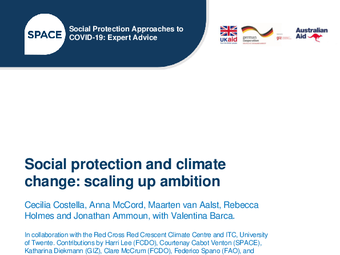Categories
Social protection and climate change: scaling up ambition
Social protection can be a strategic tool for climate risk management and provides an important answer to the current calls for climate action and for increased resilience as we recover from COVID-19. The Paris Agreement demands rapid action to keep the average temperature from rising above 1.5 degrees, but also progress on adaptation and finance to increase resilience in the face of rising risks. However, because of the pandemic, we are now further behind on key poverty targets than just a year ago, so the window of opportunity to reduce poverty and the associated vulnerability to rising climate risks has narrowed. Social protection can be a critical policy instrument for addressing these concerns.
This paper articulates the role of social protection in addressing major socioeconomic challenges arising from climate change, especially for low- and middle-income countries, and the need to strategically link social protection and national climate change responses.


